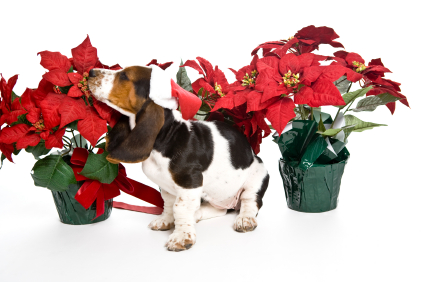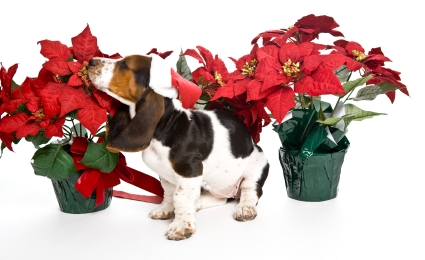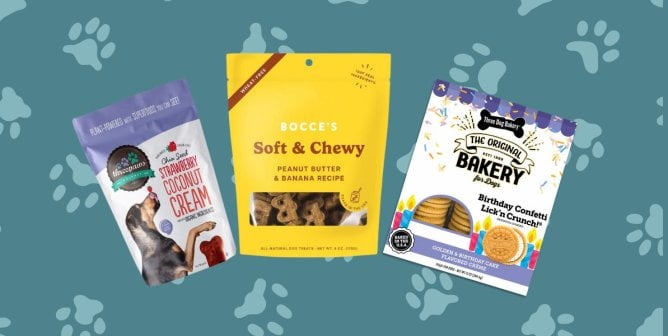The following article was written by PETA intern Keegan Baur.
I am thinking of a plant indigenous to Mexico. Its dark-green leaves are crowned by the plant’s signature fire-engine red petal-like leaves, which form the pattern of a star. It is one of the top three plants most commonly associated with Christmas, right along with mistletoe and holly. If you guessed poinsettia, you’re right on the money! Many of us happily decorate our homes with traditional holiday flora, but it’s important to protect our beloved and oh-so-curious companion animals from harmful intoxication.

Surprisingly enough, poinsettias are not actually poisonous. However, poinsettia sap can irritate the skin, and consumption of any part of the plant can cause severe oral irritation and an upset stomach. Some signs that your animal may have ingested this plant include vigorous head-shaking, excessive drooling, and frequent pawing at the head or mouth.
While red poinsettia leaves aren’t toxic, holly leaves and berries are. At first glance, those small red fruits seem innocent enough, but they can induce vomiting and diarrhea and can even be fatal if a large enough quantity is consumed.
Ingestion of mistletoe can also be dangerous. Symptoms may include nausea, excessive drooling and urination, diarrhea, vomiting, and low blood pressure. Low blood pressure causes increased respiratory and heart rates and—if severe enough—can lead to shock and death.
In addition to these, there are many other common holiday plants that are also poisonous, including the highly toxic Amaryllis plant and even the mildly toxic fir tree! However, no matter the “level” of toxicity of any given plant, you should always closely monitor your animals and keep floral decor well out of their reach. In addition, please keep your companion animals away from the Christmas tree in order to prevent possible accidents and harm.
If one of your animals does ingest a houseplant—any houseplant—always play it safe and immediately call your veterinarian or the 24-hour Pet Poison Helpline (1-800-213-6680) for further guidance. If any of these sources are unresponsive, call PETA immediately, day or night, at 757-622-7382 (then dial 2). Keep these numbers easily accessible in order to receive assistance as quickly as possible. Provide as much information as you can, including the type of plant consumed, the quantity, how long ago the animal consumed it, and any symptoms exhibited by the animal.
Again, it’s best to prevent disaster by keeping your companion animals away from any seasonal plants. Keep in mind that many of these plants are available in artificial (and therefore animal-safe!) varieties. During the holidays, let’s all ensure that our companion animals stay safe, happy, and healthy so that they can celebrate the season right along with us!






